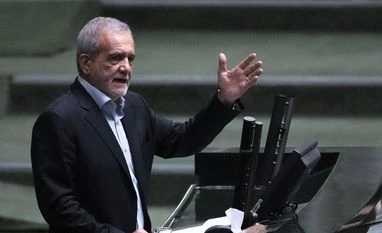Iranian President Masoud Pezeshkian on Wednesday slammed the West, saying that Israel is committing massacres in the war in Gaza and using European and American weapons to do so.
Pezeshkian, who spoke in Baghdad at the start of his first visit abroad since taking office, is hoping to cement Tehran's ties to Baghdad as regional tensions increasingly pull both majority Shiite countries into the widening Middle East fray.
Iran has been a staunch supporter of the Palestinian militant Hamas group since its Oct 7 attack on southern Israel that sparked the war in the Gaza Strip. More than 40,000 Palestinians have been killed in Gaza since the war erupted, according to local health officials. The war has also caused vast destruction and displaced around 90% of Gaza's population of 2.3 million, often multiple times.
The Israeli entity is committing massacres against women, children, young men and elderly. They bomb hospitals and schools, Pezeshkian said.
All these crimes are being committed by using European and American ammunition and bombs, he added, without elaborating.
Ahead of Pezeshkian's arrival, an explosion struck a site near Baghdad International Airport used by the US military on Tuesday night. There were no reported casualties and the circumstances of the explosion were unclear.
More From This Section
The US Embassy later described it as an attack on the Baghdad Diplomatic Services Compound, an American diplomatic facility, and that it was assessing the damage and the cause of the explosion. It didn't provide further details.
Pezeshkian's visit is significant for both countries.
For Iran, its relationship with Iraq remains crucial for economic, political and religious reasons - something that has especially been true since the US-led 2003 invasion of Iraq toppled dictator Saddam Hussein, who launched a bloody, yearslong war against Iran in the 1980s.
Baghdad, meanwhile, has been trying to balance its relationship with Tehran, which backs powerful Shiite militias in the country, as well as with the United States, which maintains a force of 2,500 troops in Iraq that remain in battle with remnants of the once-dominant extremist Islamic State group.
The American troops remain both a literal and rhetoric target for Iran, particularly as Israel's nearly year-old war on Hamas in Gaza grinds on.
Iraq's Prime Minister Mohammed Shia al-Sudani told reporters during a joint news conference with Pezeshkian that the two neighbouring countries on Wednesday signed 14 memorandums of understanding to boost relations. He also pledged that Iraq's airspace will not be used for attacks on the Islamic Republic - an apparent reference to Israel.
Pezeshkian, who was sworn in as Iran's new president in July, is also to visit Shiite shrines in the Iraqi holy cities of Karbala and Najaf, a railroad project to link the southern city of Basra to Iran and Irbil, the capital of Iraq's semiautonomous northern Kurdish region.
Still, there have been tensions between Iran and Iraq, particularly after Iranian missiles hit sites in Iraq in attacks over the past six years, targeting Kurdish militias, a base housing American forces and also what Tehran alleged were Israeli sites in Iraq.
Iran also fired missiles and flew drones over Iraq in its unprecedented direct attack on Israel in April. That attack followed a suspected Israeli strike on an Iranian diplomatic compound in Damascus, Syria, that killed two Iranian generals and five officers, as well as a member of the Lebanese Shiite militia Hezbollah, an Iranian ally.
The Islamic Republic has also threatened further retaliation against Israel over the July assassination of Hamas leader Ismail Haniyeh in Tehran, which could include another missile barrage.
Iraq also needs the close ties to maintain Baghdad's supply of imported Iranian natural gas to meet its electricity needs. A barter deal for Iraqi crude oil has seen the supply continue, though US sanctions targeting Tehran over its rapidly advancing nuclear program have put pressure on Baghdad.
Meanwhile Tuesday, the United States and Britain formally accused Iran of supplying short-range ballistic missiles to Russia to use against Ukraine, announcing new sanctions on both Moscow and Tehran.
The continued presence of US troops in Iraq remains a concern for Iran. Since the Israel-Hamas war broke out, Iraqi militias allied with Iran have targeted US forces here, leading to American airstrikes targeting the militias. Iraqi politicians continue to debate the issue of whether to back having American troops remain in the country.
)